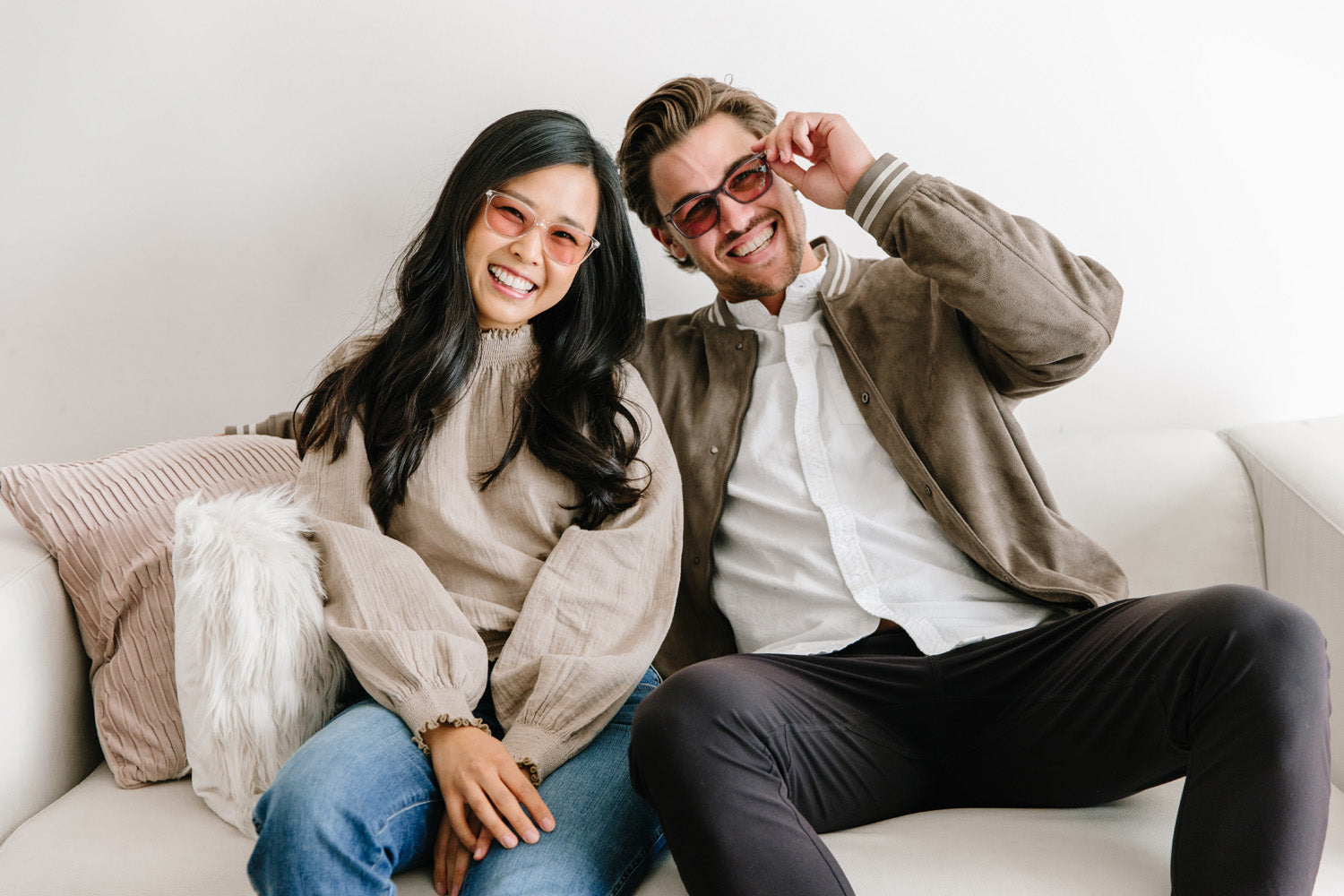We did it. We now know which migraine glasses are the best.
If you’re wondering how, we first asked ourselves the following questions:
- From a science standpoint, what makes migraine glasses effective?
- What types of glasses are migraine glasses (and which are not)?
Then, we went into the lab and measured popular migraine glasses brands to see if their data is in line with what science recommends for maximum migraine reducing effectiveness.
The result of our test produced a clear winner.
Here’s what we found.
What Makes Migraine Glasses Effective?
Migraine glasses are much more than tinted glasses.
To understand what makes migraine glasses work, you need to know that not all types of light are created equally. You also need to know why blocking all light by wearing sunglasses or sitting in a dark room for days is a bad idea.
Some Light is Really Uncomfortable
There is a reason why so many people with photophobia and chronic migraine tend to be more bothered by some kinds of light. Studies have shown that blue and amber light aggravate light sensitivity, potentially triggering migraine attacks and other symptoms, like discomfort and nausea.
For example, fluorescent light is a big offender for people who are light sensitive or get light-triggered migraines. This is because fluorescent light emits more of these bothersome wavelengths than other types of light.
For migraine glasses to be effective, they need to filter out a lot of the blue and amber light.
Some Light is Soothing
Just like blue and amber light cause trouble for sensitive people, other types of light can be soothing to those same people. Green light has actually been shown to reduce headache severity and photophobia. But it can’t be just any green light — it has to be a narrow and specific band of green.
So along with blocking the blue and amber light, effective migraine glasses should be precisely created to simultaneously allow this beneficial band of green light to pass through.
As you can imagine, creating glasses with that precise of a tint is no easy job, which is why it’s so important to know what you’re really getting when you buy migraine glasses.
Blocking All Light is a Bad Idea
While putting on sunglasses might seem like an easy fix when you feel a migraine coming on, it’s actually detrimental. This is because you run the risk of dark-adapting your eyes, making you even more sensitive over time.
Remember the last time you went to a matinee movie and walked out of the theater into the sunshine? Ouch! You spent two hours essentially dark-adapting your eyes, so that when you went outside, you could barely stand to open your eyes.
The precisely tinted, lighter-colored lenses of migraine glasses block only the troublesome light, but let the rest in. This helps you avoid the discomfort of the blue and amber light, but let in the soothing green and other types of light that don’t cause a problem.
With migraine glasses, you won’t be dark-adapting your eyes and making the problem worse.
Are They Migraine Glasses or Not?
You may be looking at reputable brands of migraine glasses, but have a hard time deciphering the differences between them. Or you may also be looking at glasses marketed as “migraine glasses” which aren’t actually migraine glasses at all.
Now that you know what makes migraine glasses effective, let’s look at what makes specific types and brands of glasses good or bad for your condition.
Sunglasses
The Good
- When you’re outside in bright light, a good pair of sunglasses is a must.
The Bad
- For the reasons stated above, sunglasses are not migraine glasses. If you’re having a migraine attack or are trying to prevent one, leave the sunglasses outside and wear migraine glasses instead.
Blue Light Blocking Glasses
The Good
- Blue light glasses are made under several brand names, such as Quay, Felix Gray, and Everscroll by MVMT.
- Many people say that wearing blue light glasses helps with eye strain, especially during computer use.
- Blue blockers are inexpensive and easy to come by (Amazon has a ton).
- You can wear them all day without adverse effects.
The Bad
- Like sunglasses, blue light glasses are not migraine glasses.
- Despite extensive study, blue light glasses haven’t been shown to reduce migraines or light sensitivity symptoms. They simply don’t block enough of the specific wavelengths that aggravate migraine and light sensitivity.
- When tested from brand to brand and pair to pair, blue light glasses vary significantly in the type of light they block.
- No brand of blue blockers is designed to block the bothersome amber light.
For example, a specific brand of blue light glasses, called Migraine Shields, are marketed to migraineurs but aren’t actually migraine glasses.
While they are good quality and likely to block more blue light than other blue blockers on the market, their tint is completely different from migraine glasses. They also aren’t currently available in prescription lenses.
FL-41 Lenses
The Good
- FL-41 glasses actually are migraine glasses.
- The original FL-41 tint was well researched and tested for its time, and helped many people reduce their symptoms when exposed to bright light (particularly fluorescent).
- The FL-41 tint formed the basis for further study of light sensitivity and how to treat it.
- Unlike blue blocking glasses, FL-41 glasses block both blue and amber light, which is necessary for reducing the symptoms of photophobia and migraine.
The Bad
- Since the introduction of FL-41 in 1991, we’ve learned a lot more about the types of light that both hurt and help us. FL-41 lenses simply don’t have today’s advanced technology.
- While it blocks blue and amber light, FL-41 also blocks as much as 80% of the soothing green light.
- FL-41 lenses are inconsistent. When tested across different suppliers, glasses sold as FL-41 were found to have wide variations in lens color, spectral characteristics, quality, and more.
- When buying a given brand of lenses sold as FL-41, you may be getting cheap colored lenses that don’t do anything but distort the world around you.
Who Makes the Best Migraine Glasses?
When it comes to specific brands of migraine glasses, migraine patients have a handful of reputable options. But since each one has its own development and manufacturing processes, they don’t all deliver the same results.
We’ll look at two reputable options: Axon Optics & Theraspecs.
But which ones are the best?
1. Axon Optics
Axon Optics was founded by one of the original pioneers of migraine glasses. Over the last 2 decades, his leadership and research have driven us to improve on the original FL-41 tint, making Axon Optics powered by Avulux® Migraine and Light Sensitivity Lenses the best migraine glasses.
Here are a few specific improvements that have been made.
Block the Bad Light, Let in the Good
Because Axon Optics bases its development on the latest research, our Avulux lenses are engineered to 1) block the blue and amber light that aggravate light sensitivity and migraine and 2) allow the soothing green light in.
Less Color Discoloration
Axon Optics have a lighter hue than other brands (TheraSpecs® for example). In this image, you can see the difference.

Why is this important? Because it means your outlook has very little color distortion. While you’re wearing our glasses, colors will look almost the same to you as they look without them. It also means other people will see less distortion when they see you wearing our glasses.
To you and the people around you, Axon Optics glasses just look more “normal.”
No Dark Adaptation
We mentioned before that the reason why sunglasses don’t make the best migraine glasses is because over time, they tend to make your eyes adapt to darkness. This can make your light sensitivity even worse.
Our Avulux lenses are engineered to let in as much of the soothing light as possible. Our lenses filter out the problematic light but let 65% of light overall, so you won’t make your sensitivity worse by wearing them.
We have heard from a few extremely light sensitive users who have felt that our lenses aren’t quite dark enough for them. However, we have ample data to support the fact that our lenses are among the best, if not the best migraine glasses from a results standpoint.
We’ll get into that right now.
Backed by Science
Our Avulux lenses underwent an independent, double-blind, randomized, placebo-controlled clinical trial and are the only migraine & light sensitivity lens to ever be proven at this highest standard of clinical testing.
Also telling is the fact that the vast majority of Hit-6 survey respondents say they would recommend Axon Optics to other people with similar light sensitivity and migraine symptoms.

Tons of Options
Axon Optics is known for offering really stylish frame choices. We frequently hear from customers telling us they receive compliments from others while wearing our fashion-forward lenses, which come in 20+ different styles.
Axon Optics is also the only maker of migraine glasses to offer self-darkening transition frames that can be used both indoors and out.
And if wearing glasses isn’t really your thing, we also offer contact lenses with the same light filtering characteristics of our migraine glasses.
2. TheraSpecs
TheraSpecs is a well-known retailer of migraine glasses, but are they the best migraine glasses on the market? TheraSpecs lenses use the traditional FL-41 tint created back in 1991 to protect sensitive individuals from the effects of fluorescent light. This is good, but as we pointed out earlier, there have been many advancements made since then.
Block Blue Light is Good
TheraSpecs lenses are reported to filter nearly 80% of blue light at 480 nanometers. According to them, that’s the wavelength most likely to cause pain and trigger symptoms like migraine.
Blocking Blue and Amber Light Would Be Better
Filtering the blue light is good, but according to research, both blue and amber light are problematic for light sensitive people.
In testing, TheraSpecs lenses do block some amber light, but at a much lower ratio than the blue light. By contrast, Axon Optics lenses are actively focused on blocking both blue and amber light.
TheraSpecs and Green Light
While TheraSpecs lenses are very good at blocking the most problematic wavelengths of blue light, they also manage to block 80% of the soothing green light.
Since green light has been shown to help migraineurs, TheraSpecs might be more effective for users if green light were allowed to penetrate the lens. See the following graphic for reference.

A Darker Lens
On the surface, it might seem that for light sensitivity, using a darker lens provides better protection. For some people, that may hold true.
But if you consider the risk of dark adapting your eyes and making your sensitivity worse, you realize that for most people, letting in more of the non-offending light is a good thing.
The graphic below shows the difference in darkness between the TheraSpecs lens and the Axon Optics lens. You’ll see that the TheraSpecs lens lets in 20% less overall light (including the good kind) than the Axon lens.

TheraSpecs and Reflection
Glare is an enemy of anyone with light sensitivity. In testing, TheraSpecs lenses have been found to reflect 3.4% of blocked light back toward the person wearing them.

Stylish Frames
Fortunately for you, migraine glasses have evolved to embrace current eyeglass trends. Although TheraSpecs doesn’t offer quite as many frame options as Axon Optics, there are still many stylish choices
Choosing the Best Migraine Glasses for You
If you’re living with chronic migraine attacks, vestibular migraine, ocular migraine, and light sensitivity symptoms, you want migraine glasses backed by clinically-validated survey data and driven by decades of research. Axon Optics covers all those bases. As a standout choice for migraine glasses, they were also developed alongside a leading neuro-ophthalmologist.







